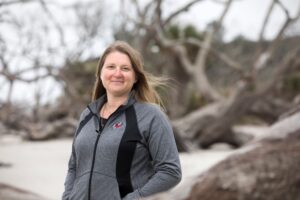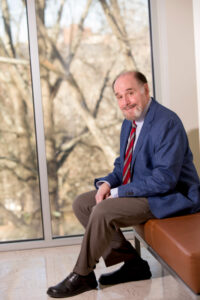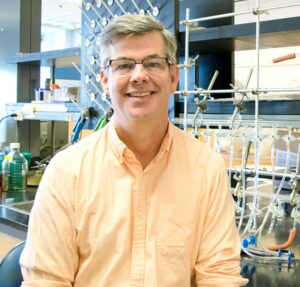Three University of Georgia faculty members have been named Regents’ Professors in recognition of the national and international reach of their innovative and pace-setting scholarship. Regents’ professorships are bestowed by the Board of Regents of the University System of Georgia and are the highest professorial recognition in the state’s system of public colleges and universities.
The university’s 2022–2023 Regents’ Professors are Jenna Jambeck, Georgia Athletic Association Distinguished Professor in Environmental Engineering in the College of Engineering; David P. Landau, Distinguished Research Professor in the department of physics and astronomy and director of the Center for Simulational Physics in the Franklin College of Arts and Sciences; and Michael Terns, Distinguished Research Professor in the department of biochemistry and molecular biology and the department of genetics, also in the Franklin College. Each of their Regents’ professorship appointments will take effect on July 1.
“The high caliber of research and scholarship produced by professors Jambeck, Landau and Terns has brought them well-earned national and international acclaim,” said S. Jack Hu, the university’s senior vice president for academic affairs and provost. “I am grateful for their commitment to mentoring students and their world-renowned research and scholarship that address the challenges we face as a society.”
Jenna Jambeck

Jenna Jambeck (Photo by Dorothy Kozlowski/UGA)
As the Georgia Athletic Association Distinguished Professor in Environmental Engineering, Jambeck researches the impact of plastic contamination on the world’s oceans and waterways. Over the past 25 years, Jambeck has established herself as an internationally recognized specialist on global waste management. In 2022, she became the second UGA faculty member to earn a MacArthur Fellowship, commonly known as a “Genius Grant,” for her work investigating the scale of plastic pollution and galvanizing efforts to address plastic waste.
In a groundbreaking 2015 study published in the journal Science, Jambeck and her colleagues were the first to quantify the amount and sources of land-based plastic waste entering the ocean. Two years later, Jambeck and her colleagues published another seminal work that offered the first comprehensive analysis of the production process and lifecycle of mass-produced plastics.
Jambeck’s research led to international recognition from governmental agencies and organizations across the world, and she has been asked to lead multiple national and global projects. In 2018, Jambeck received a National Geographic Fellowship to lead the “Sea to Source” expedition, the first female-led expedition team that developed strategies to mitigate plastic contamination in the Ganges River Basin in India and Bangladesh. She has since worked on similar projects in places ranging from Southeast Asia to Latin America. Jambeck’s impact can be felt in the U.S. with her recent involvement in the Mississippi Plastic Pollution Initiative, a citizen science initiative to quantify plastic pollution along the Mississippi River.
“Her work has led her to be one of the strongest voices for the importance of policy action to reduce plastic waste contamination in the U.S. and throughout the world,” said Donald J. Leo, dean of the UGA College of Engineering and UGA Foundation Professor in Engineering.
Jambeck has been invited to participate in policy discussions with the G7 and G20, the U.S. Congress, the High Level Panel for a Sustainable Ocean Economy and the United Nations Environment Program. From 2017 onward, she has worked in public diplomacy with the U.S. Department of State as an International Informational Speaker to discuss collaborative solutions among countries for reducing plastic pollution. From 2020 to 2022, she served on a consensus study committee of the National Academies of Sciences, Engineering and Medicine on “United States Contributions to Global Ocean Plastic Waste.”
In addition to her groundbreaking research publications and policy work, Jambeck is known for her innovation and creativity. In 2010, she co-developed the “Marine Debris Tracker” mobile app that allows people to catalog information about litter and debris. Since then, users have logged more than 6.5 million items in over 92 countries on the application. In 2014, she used the app as she sailed across the ocean with 13 other women to collect data on plastic pollution and promote women in underrepresented disciplines. Jambeck continues to use the innovative citizen science tool in her national and global research projects.
Jambeck has also been recognized for her notable contributions to teaching and research at UGA. She is a recipient of the UGA Creative Research Medal and a Public Service and Outreach Fellowship and was the keynote speaker at the 2018 CURO Symposium. Since joining the university in 2009, Jambeck has significantly contributed to the development of the undergraduate environmental engineering program, which was new at the time, and received both teaching and research awards in the college. She has also built a reputation as a dedicated mentor to early career scholars and students.
David P. Landau

David Landau (Photo by Dorothy Kozlowski/UGA)
With a career spanning more than 50 years at UGA, Landau is a distinguished member of the faculty in the department of physics and astronomy. He is recognized internationally for his pioneering scholarship on computational/simulational condensed matter physics and has become known for his use of experiments, analytic theory and simulations to create research applications in physics and other fields. Notably, he created and has served as director of the Center for Simulational Physics at UGA since 1986. Under his leadership, the center has built an international reputation for attracting top scholars from around the world to attend annual workshops.
Landau’s impact on the field of simulational physics is further evident in his published work. Along with Kurt Binder, he co-authored “A Guide to Monte Carlo Simulations in Statistical Physics,” a textbook now in its fifth edition and widely used in computational physics courses worldwide. He has published more than 450 peer-reviewed articles and is well known within the field for inventing the “Wang-Landau” algorithm, which estimates the density of states of a system, with graduate student Fugao Wang. Landau’s expertise in the field of simulational physics has led to invitations to speak at numerous conferences around the world including in Russia, Germany, China, Thailand and Brazil.
In addition to his research prowess, Landau is known as a dedicated mentor to students and junior colleagues. Under his tenure, more than 40 graduate students have completed their Ph.D. and gone on to have successful careers in industry, academia and national laboratories. He is also known for being a strong advocate for women in physics and plays an active role in providing them with mentorship and advice.
Landau’s dedication and service extends beyond UGA. He served as the principal editor of Computer Physics Communications from 1997 through 2021. He is also a referee for more than 20 journals, a member of national and global committees and a proposal reviewer for numerous foundations, councils, programs and commissions. Currently he serves as chair of the U.S. Liaison Committee from the National Academies to the International Union of Pure and Applied Physics.
For his research, mentorship and service, Landau has received several prestigious awards including three from the Alexander von Humboldt Foundation, an organization that promotes international academic cooperation between scientists and scholars. He also received the Aneesur Rahman Prize for Computational Physics and the Nicholson Medal for Human Outreach, both presented by the American Physical Society. Landau has earned several UGA awards during his tenure, including the Creative Research Medal and the Lamar Dodd Creative Research Award.
Landau’s colleagues describe him as having a gift for making complex scientific ideas understandable to a wide range of audiences. “David is one of the very best out there … a brilliant thinker, a tremendous mentor, and a very careful and accomplished scientist,” said Jayanth Banavar, Knight Chair of Physics at the University of Oregon.
Michael Terns
Known as a pioneer in the CRISPR/Cas field, Terns has established himself as a leader in scientific discovery. His research centers on RNA biology, and he is widely regarded as one of the scientists who made foundational breakthroughs in CRISPR/Cas biology that led to new gene editing techniques and new possibilities in the development of anti-cancer drugs. In applying his research, Terns has also created biotechnical and biomedical applications that have resulted in several patents.
“Dr. Terns exemplifies the best of science — curious, enthusiastic about his own and other’s work, measured in his approach, and thoughtful,” said Feng Zhang, James and Patricia Poitras Professor of Neuroscience at the McGovern Institute for Brain Research and associate professor in the Departments of Brain and Cognitive Sciences and Biological Engineering at the Massachusetts Institute of Technology. “These qualities have made him a leader in the CRISPR biology community and brought him recognition far beyond.”
Terns has published his discoveries in 100 studies in high-impact journals, and his work has been cited more than 12,000 times. For 25 years, he has sustained continuous funding from the National Institutes of Health and has received more than $16 million in external funding from sources including the National Science Foundation, NIH, American Cancer Society and the March of Dimes. He has been invited to speak at more than 134 international conferences and institutions across the United States, Europe and Asia.
Since joining UGA in 1995, Terns has made his mark in the department of biochemistry and molecular biology as well as the departments of genetics and microbiology. Over the years he has trained 25 Ph.D. students, 11 postdoctoral fellows and 88 undergraduate student researchers. He has also served on numerous committees and is known for helping to advance the careers of junior faculty members.
In recognition of his thoughtful mentorship and cultivation of student talent, particularly those who are underrepresented in STEM fields, Terns received the UGA Undergraduate Researcher Mentor Award in 2018, and he was the keynote speaker at the 2017 CURO symposium. Terns’ other honors include the Maximized Investigator Research Award from the NIH and the UGA Creative Research Medal. He is an American Cancer Society Research Scholar and a UGA Distinguished Research Professor.
The three Regents’ Professors will deliver the 2023 Charter Lecture at 1p.m. on March 30 at Masters Hall in the University of Georgia Center for Continuing Education & Hotel, with a reception to follow.
Regents’ Professors receive a permanent increase in salary of $10,000 in the year they are initially appointed. In addition, awardees receive yearly academic support of $5,000 as long as they hold the Regents’ Professorship. For a complete list of Regents’ Professors at UGA, see https://provost.uga.edu/resources/faculty-resources/professorships/regents-professors/.








